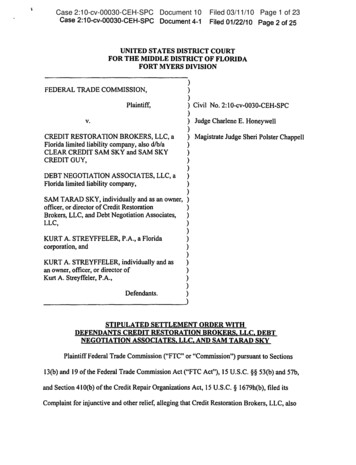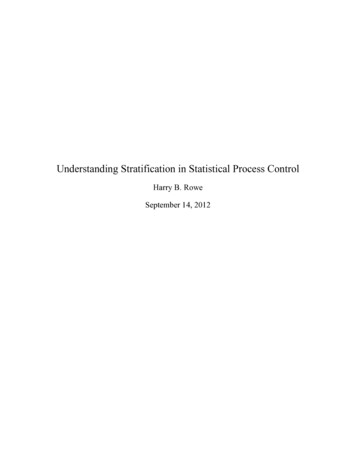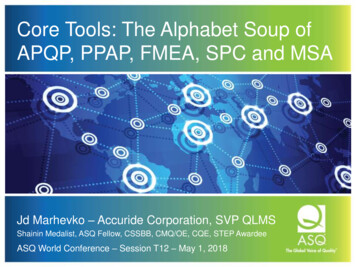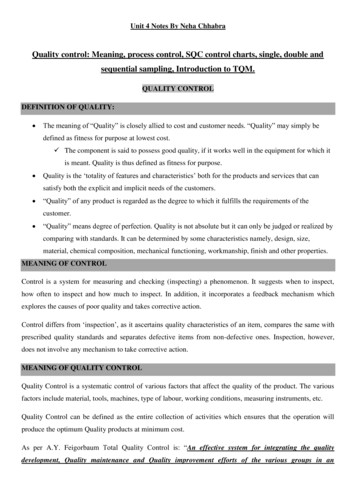
Transcription
Part 2A of Form ADV: Firm BrochureItem 1: Cover PageSPC Financial, Inc.3202 Tower Oaks Blvd. / Ste. 400 / Rockville, MD 20852Phone: 301-770-6800 / Fax: 301-770-9031Website: www.spcfinancial.comMarch 30, 2018This brochure provides information about the qualifications and business practices of SPC Financial, Inc. If youhave any questions about the contents of this brochure, please contact us at 301-770-6800 or info@spcfinancial.com.The information in this brochure has not been approved or verified by the United States Securities and ExchangeCommission or by any state securities authority.Additional information about SPC Financial, Inc. is available on the SEC’s website at www.adviserinfo.sec.gov.March 2018 Copyright 20183202 Tower Oaks BoulevardSuite 400Rockville, MD 20852-4216— Securities offered through —301-770-6800 / www.spcfinancial.com1Raymond James Financial Services, Inc.MEMBER FINRA/SIPC
Part 2A of Form ADV: Firm BrochureItem 2: Material ChangesSPC Financial, Inc. has not undergone material changes since its last brochure dated December 21, 2017.2
Part 2A of Form ADV: Firm BrochureItem 3: Table of ContentsItem 1:Cover Page. 1Item 2:Material Changes. 2Item 3:Table of Contents. 3Item 4:Advisory Business. 4Item 5:Fees and Compensation. 7Item 6:Performance-Based Fees and Side-By-Side Management.11Item 7:Types of Clients. 12Item 8:Methods of Analysis, Investment Strategies and Risk of Loss. 12Item 9:Disciplinary Information.13Item 10:Other Financial Industry Activities and Affiliations.13Item 11:Code of Ethics, Participation or Interest in Client Transactions and Personal Trading.15Item 12:Brokerage Practices.15Item 13:Review of Accounts.19Item 14:Client Referrals and Other Compensation.19Item 15:Custody.19Item 16:Investment Discretion. 20Item 17:Voting Client Securities. 20Item 18:Financial Information. 203
Part 2A of Form ADV: Firm BrochureItem 4: Advisory BusinessSPC Financial, Inc. (“SPC” or “Adviser”) is an Independent Registered Investment Advisor/SEC engaged since 1970in Financial Planning and Portfolio Management services for individual, corporate, institutional, ERISA funds, andcharitable clients. SPC primarily invests in the following types of investments: Equity securities (exchange listed, over-the-counter, and foreign issuers) Corporate debt securities (other than commercial paper) Certificates of deposits Municipal securities Investment company securities (variable life insurance, variable annuities, and mutual fund shares), Exchange Traded Funds U.S. government securities Options contracts on securities Other types of investments including: collectibles, hard assets, life insurance, unit investment trusts,alternative investments and fixed annuitiesAdvice is tailored to individual Client needs. Client needs are identified by the collection of pertinent information throughinterviews with the Client and detailed financial planning, as applicable. Clients may be able to impose reasonablerestrictions on their accounts. Reasonable restrictions may include the designation of particular securities or typesof securities that should not be purchased in their account (i.e., Company XYZ or companies involved in a particularindustry, etc.), or should not be sold if held in their account. However, in some cases, since investment discretion hasbeen delegated to SPC or a third-party manager, SPC or the manager may determine that the implementation of such arestriction may be impractical. In the event such a determination is made, the Client will be notified promptly.A related firm, Sella & Martinic, LLC, offers tax return preparation through a separate engagement letter withclients. Insurance products (life, disability, and long-term care insurance) are offered by SPC’s licensed advisors. SPCemploys Investment Adviser Representatives (“IARs”) and Financial Planners, as well as various professional andadministrative staff, some of whom may be registered securities representatives and licensed insurance brokers/agents.As of December 31, 2017, SPC had the following assets under management. The figures are approximate:Discretionary:Non DiscretionaryTotal ountsAccounts1,7281,3123,040Privacy PolicySPC is committed to maintaining the confidentiality, integrity and security of personal information entrusted to itby current, past and potential Clients. SPC collects non-public personal information about Clients from the followingsources: information received from Clients on applications or other forms and information about Client transactionswith SPC, its affiliates or others. SPC restricts access to non-public personal information about Clients to employeeswho need to know that information to provide products or services to Clients. SPC employees are subject to a strictemployment policy regarding confidentiality.SPC does not disclose, without client permission, any non-public personal information about Clients or former Clientsto anyone except as required by law. SPC may disclose information to nonaffiliated parties as required by law, such asgovernment agency or regulators. SPC may use personal information for the purpose of offering or furnishing productsand services, including services offered by Sella & Martinic, LLC. Client names and addresses, or other financialinformation, are never given or sold to unrelated third parties for use except for the below described service.SPC will provide certain client information to an unaffiliated third party class action clearing firm, Chicago ClearingCorporation (“CCC”). SPC will periodically provide client information to CCC in order that CCC may process classaction claims that Clients may hold by virtue of Clients’ securities held in Raymond James Financial Services, Inc.accounts. Clients may elect to opt-out of this service by signing a SPC form. Clients, who are residents of California,Vermont, Alaska, Maine, Massachusetts, North Dakota and Louisiana in accordance with those states’ privacy policies,will be offered the option to opt-in to SPC’s arrangement with CCC since by law they are automatically opted-out.4
Part 2A of Form ADV: Firm BrochureItem 4: Advisory BusinessSPC retains records relating to professional services that it provides to better able assist Clients with professional needsand, in some cases, to comply with professional guidelines. In order to protect Client non-public personal information, SPCmaintains physical, electronic and procedural safeguards that comply with professional standards. Under strict confidence,a backup database of SPC Clients and accounts is maintained.Officers, Investment Adviser Representatives and CERTIFIED FINANCIAL PLANNER ProfessionalsSPC executive officers, IARs and CERTIFIED FINANCIAL PLANNER Professionals are noted below, including theireducation, date of birth, commencement date with SPC, and business background if employed by SPC for fewer than five(5) years.E. Geoffrey Sella, CPA/PFS, CFP CEO and Principal OwnerIAR (1991)Marquette University, BSDOB 1958Raymond James Financial ServicesRegistered PrincipalDaniel A. Ball, Esq.General Counsel and CCO (2015)IAR (2017)Georgetown University Law Center,LL.M., Securities RegulationAntioch School of Law, JDUniversity of Texas at Austin, BADOB 1956Ball Law Offices, P.C. (2006-2015)Selzer, Gurvitch, Rabin & Obecny, Chtd.(2003 - 2006)Goldberg & Ball f/k/a Lewis, Goldberg &Ball, P.C. (1994 - 2003)Law Offices of Daniel A. Ball(1988 - 1994)U.S. Securities & Exchange Commission(1986- 1988)Lockie & Associates, P.C. (1982-1985)Raymond James Financial ServicesRegistered RepresentativeLeo Martinic, CPATreasurerIAR (2001)Marquette University, BSDOB 1958Raymond James Financial ServicesRegistered PrincipalWilliam Gregory Chatfield, CFP SecretaryIAR (1991)Frederick Community College, AADOB 1962Raymond James Financial ServicesRegistered Options PrincipalMatthew E. Gilchrist, CPA/PFS, CFP IAR (2009)University of Maryland, BADOB 1984Raymond James Financial ServicesRegistered RepresentativePamela L. Mudd, CPA, CFP IAR (2004)University of Maryland, BSDOB 1965Rory M. McGlynn, CFP IAR (2012)College of the Holy Cross, BADOB 1987Raymond James Financial ServicesRegistered RepresentativeJason J. Davis, CIMA Financial AnalystIAR (2012)University of Maryland, BADOB 1987Raymond James Financial ServicesRegistered PrincipalPhilip J. Mantua, Jr., MBAFinancial Planning AssociateIAR( 2016)Eastern University, BA and MBADOB 1988New York Life Insurance (2014-2015)Raymond James Financial ServicesRegistered RepresentativeElise M. Weinstein, CFP Financial Planning AssociateIAR (2017)Boston University School of Law, JDUniversity of Pennsylvania, BSDOB 19675Charles V. Kimmel, III, CFP Financial Planning Dept. Supervisor (2015)IAR (2009)University of Maryland UniversityCollege, BSDOB 1985Raymond James Financial ServicesRegistered RepresentativeJason C. PerlmanFinancial Planning AssociateIAR (2016)University of Tennessee, BSDOB 1991Raymond James Financial ServicesRegistered RepresentativeKevin P. IlerFinancial Planning AssociateIAR (2016)Clemson University, BSDOB 1991Goodwin Brothers (2014-2015)Raymond James Financial ServicesRegistered RepresentativeKimberly E. ChidelSr. Client Service AssociateIAR (2016)West Virginia University, BADOB 1993AXA Advisors, LLC (2015-2016)Raymond James Financial ServicesRegistered Representative
Part 2A of Form ADV: Firm BrochureItem 4: Advisory BusinessProfessional Designation FinancialPlanner (CFP )CertifiedFinancialPlanner Board ofStandards, Inc.CertifiedPublicAccountant(CPA)State Boards of To attain the right to use the Certified Public Accountant designation (CPA), an individual mustAccountancysatisfactorily complete the following:for CPA Education – College education (typically 150 credit hours with at least a baccalaureate degree andlicensesa concentration in accounting)American Experience – Minimum experience levels (most states require at least one year of experienceInstitute ofproviding services that involve the use of accounting, attest, compilation, management advisory,Certified Public financial advisory, tax or consulting skills, all of which must be achieved under the supervisionAccountantsof or verification by a CPA)(AICPA) Examination – Successful passage of the Uniform CPA ExaminationRequirementsA financial planner who has completed study and passed examinations in risk management, investments,tax planning, retirement planning, and estate planning. Must have a minimum level of three yearsexperience, continue to update knowledge in the field, and adhere to prescribed code of ethics.Continuing Education/Experience Requirements: 30 hours every 2 years Continuing Education – Successful completion of 40 hours of continuing professional education(CPE) each year (or 80 hours over a two year period or 120 hours over a three year period) Ethics – All members must adhere to the AICPA’s Code of Professional Conduct which requires thatthey act with integrity, objectivity, due care, competence, fully disclose any conflicts of interests(and obtain client consent if a conflict exists), maintain client confidentiality, disclose to the clientany commission or referral fees, and serve the public interest when providing financial services*Information on requirements: American Institute of Certified Public nInstitute ofCertifiedPublicAccountants(AICPA)To attain the right to use the Personal Financial Specialist (PFS), one must successfully meet thefollowing requirements: Education – Candidate must complete the minimum education, experience and testing required of aCPA in addition to a minimum level of expertise in personal financial planning. The individual musthold a CPA license. In addition, they must fulfill 75 hours of personal financial planning CPE credits. Experience – Candidates must fulfill 3,000 hours of personal financial planning business experience Examination – Candidates must successfully pass a comprehensive financial planning exam Continuing Education – Must fulfill 60 hours of financial planning CPE credit every three years. Ethics – PFS is required to adhere to the AICPA’s Code of Professional Conduct, and isencouraged to follow AICPA’s Statement on Responsibilities in Financial Planning practice. Membership – Candidates must also be an active member of the AICPA.*Information on requirements: American Institute of Certified Public MA )Investments& WealthInstitute ,Those who have earned the CIMA certification must meet the eligibility requirements, includingthe “four E’s”: experience, education, examination, and ciation (IMCA ) Pass a background check Have at least three years of work experiences in the financial services industry Study for and pass a Qualification Examination Completion of an executive education classroom program, either in-person or online, at a top 20business school registered with the IMCA Study for and pass a comprehensive Certification Examination Have a satisfactory record of ethical conduct as determined by the IMCA Admissions Committee Agree to abide by the IMCA Ethics standards and sign a license agreement Every two years following initial certification, members must complete and report a minimum of40 hours of continuing education credit, including two ethics hours.6
Part 2A of Form ADV: Firm BrochureItem 5: Fees and CompensationINVESTMENT ADVISORY SERVICES FEESFinancial PlanningSPC contracts with Clients to provide investment advisory services including the development of a strategy and investmentplan based upon the Client’s goals and needs. SPC also offers Clients all the services listed on the Investment AdvisoryAgreement (“Financial Planning”). Each Client is assigned one or two Investment Adviser Representatives (“IAR”) who willoversee the implementation and maintenance of the Client’s plan. A Financial Plan may include 1) a review, analysis andadvice on the Client’s assets, including assets not held with SPC’s selected broker/dealer (see Portfolio Management), 2)retirement planning, 3) survivor needs analysis, 4) income, estate and gift tax planning, 5) education funding, and 6) life,disability, and long term care insurance planning. In preparing a Financial Plan for a Client, the IAR gathers informationdeemed relevant to the particular plan provided through personal interviews with the Client and through documentsand/or Client profile questionnaires completed by the Client. Each service includes an analysis of the Client’s financialinformation, which may, but is not necessarily required to include items such as: their current assets, income, investments,liabilities, short and long-term capital and liquidity needs, risk tolerance and short and long-term financial goals andobjectives. IARs may also help the Client coordinate the implementation of any recommendations made, including referralsto other practicing professionals such as an attorney, accountant or insurance agent whose services may be required.SPC and the Client agree in advance to the scope of Financial Planning services and the fee associated with the services.Basic Fee ScheduleSPC may charge an hourly rate of up to 400 per hour agreed in advance of service or a flat fee for the initial creation/implementation of a Financial Plan. The fee is billed upon completion of services. The minimum fee generally is 400 for aFinancial Plan unless reduced or waived by SPC in its discretion.Refund Policy/Termination Procedure (Basic Fee Schedule)If the fee is paid in advance of services, the Client may request a refund within five (5) days of payment by terminationeither verbally or in writing. A Client that terminates the advisory agreement within the first five (5) business days ofentering into the initial advisory agreement will have all advisory fees incurred refunded. The Client has no furtherobligation to SPC upon the return of the fee and SPC has no further obligation to the Client. If the Client retains SPC forinitial financial planning services only in accordance with the basic fee schedule, the financial advisory relationship willbe terminated upon SPC’s rendering of the services and receipt of the Client’s payment.Annual Fee ScheduleThe annual fee range may be 350 - 2,000 as agreed in advance by SPC and the Client.Refund Policy/Termination Procedure (Annual Fee Schedule)If the fee is paid in advance of services, the Client may request a refund within five (5) days of payment by terminationeither verbally or in writing. A Client that terminates the advisory agreement within the first five (5) business days ofentering into the initial advisory agreement will have all advisory fees paid refunded.Client Agreement/AssignmentThe Financial Planning fee paid by the Client to SPC is based upon an Investment Advisory Agreement, (individually/collectively with the below referenced affiliated Broker Dealer Agreement(s), the “Client Agreement”). SPC will notassign a Client Agreement without the Client’s consent.Portfolio ManagementSPC contracts with Clients to provide investment advisory services including periodic review and recommendations ofsecurities portfolio(s) held in a Client’s Broker Dealer account(s) (“Portfolio Management”). SPC’s selected Broker Dealeris Raymond James Financial Services, Inc., member FINRA/SIPC, and Raymond James & Associates, member NYSE/SIPC(“Raymond James”, “RJFS”, and/or “RJA”). Clients execute a Broker Dealer Agreement for each securities account heldat Raymond James. Raymond James provides to SPC, among other services, custody of Client accounts and clearing ofClient securities transactions. Please refer to Item 10, Other Financial Industry Activities and Affiliations, for more completeinformation. Investment advisory services are offered through SPC. SPC is not a registered broker/dealerand is independent of Raymond James.7
Part 2A of Form ADV: Firm BrochureItem 5: Fees and CompensationFee ScheduleSPC and its IARs receive compensation for Portfolio Management as described below. Portfolio Management fees areseparate from and in addition to Financial Planning fees.Broker Dealer Agreement / Annual Asset-Based FeeFor Portfolio Management investment advisory services, SPC may charge the Clients a fee, billed quarterly, not to exceedtwo and one-quarter percent (2.25%) annually of the asset value of the Clients’ Broker Dealer securities account(s) held atRJFS (“Asset-based Fee”). The Asset-based Fee and accounts are specified in writing in the Broker Dealer Agreement(s),the SPC Investment Advisory Agreement, or both. A portion of the Asset-based Fee is paid to RJFS for administrativeservices. When a Portfolio Management account is opened, the Asset-based Fee is billed for the remainder of the currentquarterly billing period and is based on the initial contribution. Thereafter, the Asset-based Fee is billed quarterly inadvance, based upon the account asset value on the last business day of the previous calendar quarter, and becomes duethe following business day. The brokerage statements issued by RJFS will disclose the amount of the Asset-based Fee.Payment of the Asset-based Fee in advance may cause the actual percentage amount charged to the Client during anyquarter to be more or less than the stated percentage due to fluctuations in the Client’s account(s) value during the quarter,deposits and/or withdrawals made during the quarter.Clients authorize and direct Raymond James as Custodian to deduct Asset-based Fees from their account(s) at thebeginning of each calendar quarter. Clients authorize and direct Raymond James to pay SPC. RJFS/RJA provide variousadministrative services to Clients which include determining the fair market value of assets held in their accounts,account transactions, receipt and disbursement of funds including fees paid to SPC, interest and dividends received, andaccount gain or loss by security, as well as for the total account.The U.S. Department of Labor (DOL) enacted a rule governing retirement accounts (commonly referred to as the“Fiduciary Rule”). See Item 11: The Department of Labor Fiduciary Duty Rule. To comply with the rule, Raymond Jamesrevised how Asset-based advisory fees are assessed on retirement accounts and other investment accounts. Previously,Raymond James and SPC did not charge an Asset-based Fee on cash balances if they exceeded 20% of the Account Valuefor three consecutive quarters. The 20% exclusion has been eliminated due to the DOL rule; therefore, cash balances areincluded in the Account Value and the Asset-based Fee is applied to cash balances in retirement and other investmentaccounts. Raymond James sent written notices to SPC clients in May 2017 informing them that the billing practiceswould change as of June 2017. Clients that expect to hold cash balances in their advisory accounts should understandthat advisory fees will be assessed on the total Account Value even if cash balances exceed 20%. As an alternative, clientsmay hold these cash balances in a brokerage account to avoid being assessed an advisory fee.In non-DOL impacted retirement accounts, certain securities may be held in a Client’s AMBASSADOR accountand designated as “Administrative-Only Investments.” SPC and the Client may designate certain investments asAdministrative-Only Investments in order to temporarily waive the advisory fee over those assets. This arrangementbetween SPC and the Client may be for a security that the Client wishes to hold for an extended period of time and doesnot wish for SPC to sell in the foreseeable future. Raymond James may designate certain securities as AdministrativeOnly Investments if it determines that they are not eligible for the advisory fee (such as mutual funds purchased with afront-end sales charge through Raymond James within the last two years, new issues and syndicate offerings).PLEASE NOTE: Due to DOL regulations, the designation of Client-designated Administrative-Only Investments and themaintenance of such positions in the Client’s account are not permissible in DOL impacted retirement accounts (such asIRAs and employer sponsored retirement plans). The underlying premise of this prohibition is that the maintenance ofassets in an advisory account that are not being assessed an advisory fee introduces a conflict that the financial advisor’sadvice may be biased as a result of their not being compensated on this asset. As a result, the financial advisor mayrecommend a course of action in their and not the client’s interest (such as selling the security to increase the financialadvisor’s compensation). Raymond James has elected to preserve the ability for clients and their financial advisors todesignate assets as Client-designated Administrative-Only in their non-DOL impacted accounts in order to maintainclient choice and avoid the need to maintain a separate account to hold these securities or cash. Nevertheless, whileRaymond James cannot accommodate this level of flexibility in DOL-impacted retirement accounts, Clients can choose tomaintain securities or cash in their brokerage account that they do not wish to be assessed an advisory fee.8
Part 2A of Form ADV: Firm BrochureItem 5: Fees and CompensationThe Annual Asset-based Fees include all execution charges except (1) certain dealer-markups and odd lot differentials,transfer taxes, exchange fees mandated by the Securities Exchange Act of 1934, as amended, and any other charges ortaxes imposed by law for transactions in the account; and (2) offering concessions and related fees for public offerings ofsecurities as described in the prospectus.RJFS facilitates the maintenance of custody of Client securities positions through RJA at no additional charge, includingholding securities in nominee name.Termination Procedure (Annual Asset-Based Fee)Either party may terminate the Investment Advisory Agreement, as it relates to the Annual Asset-based Fee, uponwritten notification to the other party. If the Agreement is terminated before completion of services, any unearned feespaid by the Client will be refunded back to the Client. Termination of SPC and the Investment Advisory Agreementdoes not automatically terminate SPC or its IARs as the financial advisor or agent of record on any Client Broker Dealersecurities accounts, direct mutual fund and variable annuity accounts, or insurance contracts.Client Agreement/AssignmentThe Asset-based Fee paid by the Client to SPC is based upon the Client Agreement. SPC will not assign a ClientAgreement without the Client’s consent.AccountsFor Portfolio Management, SPC utilizes the RJFS AMBASSADOR account described below. Asset-based Fees the Clientspay for investment advice and services are based upon the value of assets in their account(s), independent of the levelof trading activity. By deciding to pay a fee based on asset values rather than commissions on transactions, a Client’s feemay be higher than the cost of a commission alternative during periods of lower trading activity.The Asset-based Fee charged is in addition to the management fees and operating expenses internally charged by openend and closed-end mutual funds and by exchange traded funds (ETFs). To the extent that a Client intends to hold sharesfor an extended period of time, these internal fund expenses should be added to the Asset-based Fees when evaluatingthe costs of a fee-based account. In addition, certain mutual fund families impose short-term trading charges (typically1% to 2% of the original amount invested) which are generally NOT waived for fee-based accounts. These short-termcharges are imposed by the funds (not SPC, RJFS or RJA) to deter “market timers” who trade actively in fund shares.Clients should consider these short-term trading charges when selecting the account and/or mutual funds in which theyinvest. These charges, as well as operating expenses and management fees, which may increase the overall cost to theClient are disclosed in each fund’s prospectus.Certain no-load variable annuities may be offered in AMBASSADOR accounts and may be subject to the Asset-basedFee, which is in addition to the mortality and expense charges, management fees and operating expenses charged bythe insurance companies offering these products. More sophisticated investments such as options and margin may beoffered in AMBASSADOR accounts. Fees for advice and execution on these securities are based on the total asset valueof the account. While a negative amount may show on a Client’s statement for the margined security as the result ofa lower net market value, the amount of the fee is based on the absolute market value. This would create a conflict ofinterest where an IAR is motivated to encourage the use of margin to create a higher market value and therefore receivea higher fee. The use of margin results in interest charges in addition to all other fees and expenses associated with thesecurities involved. The use of margin also increases the risk of loss to Client portfolios.Investments which are included in the asset value of the Client’s Asset-based Fee account(s) for purpose of calculatingthe Asset-based Fee compensation to SPC are hereinafter referred to as “Fee Investments.” These investments includeopen-end mutual funds offered with no sales commission or load, publicly traded closed-end mutual funds, ETFs,common and preferred stocks, American Depository Receipts, options contracts, real estate investment trusts, corporatebonds, U.S. Government and Government agency bonds, mortgage backed securities and municipal bonds, cash andmoney market investments, and any other investment that may, from time to time, be designated as a Fee Investment.For the purposes of
Insurance products (life, disability, and long-term care insurance) are offered by SPC's licensed advisors. SPC employs Investment Adviser Representatives ("IARs") and Financial Planners, as well as various professional and . American Institute of Certified Public Accountants (AICPA) To attain the right to use the Personal Financial .










